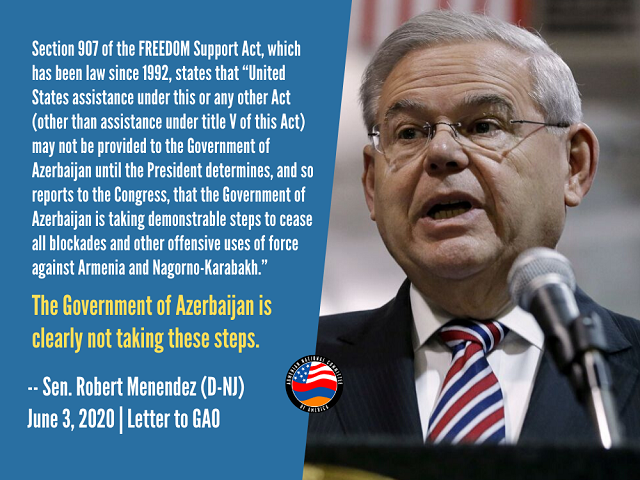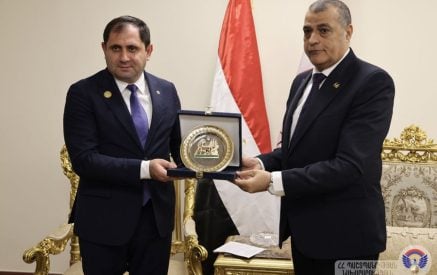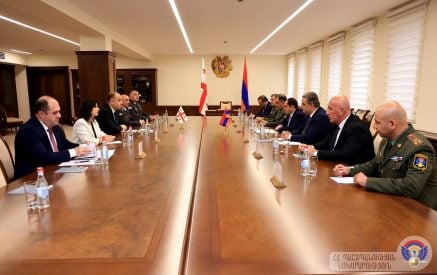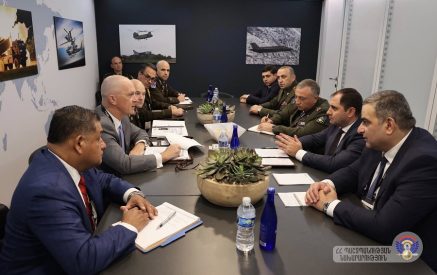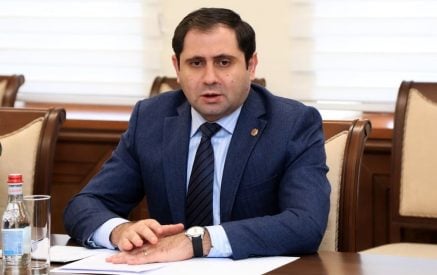— Demands Detailed Assessment Regarding Potential Violations of Section 907 of the Freedom Support Act
WASHINGTON, DC – Alarmed by a U.S. military aid program to Azerbaijan that has “skyrocketed” to more than $120 million over the past three fiscal years, Senator Bob Menendez (D-NJ) today formally requested that the Government Accountability Office (GAO) provide the Senate Foreign Relations Committee with a detailed report on this assistance program and its compliance with Section 907 of the Freedom Support Act, reported the Armenian National Committee of America (ANCA). Enacted in 1992, Section 907 places statutory restrictions and requirements on U.S. taxpayer funding to Azerbaijan until that government takes “demonstrable steps to cease all blockades and other offensive uses of force against Armenia and Nagorno-Karabakh.”
“We thank Senator Menendez for ensuring that the rapidly and recklessly expanding U.S. military aid program to an increasingly hostile Azerbaijan complies with all relevant provisions of U.S. law,” said ANCA Executive Director Aram Hamparian. “His request today for a formal GAO assessment will bring much-needed sunshine – in the form of public scrutiny and Congressional oversight – to a secretive security scheme that, by all accounts, crosses multiple legal, moral, and humanitarian lines.”
Senator Menendez, who serves as the Committee’s Ranking Member, called on the GAO to “initiate an assessment that considers, at a minimum, the following questions:”
Read also
1. What is the nature and quantity of all U.S. foreign assistance provided to the Government of Azerbaijan pursuant to the waiver of Section 907 of the FREEDOM Support Act, broken down by year, funding account, and implementing agency?
2. Was Congress informed of this assistance prior to its provision, as required by the waiver authority as outlined in the law? Was Congress informed through a formal Congressional notification, through a consult note, or through another procedure?
3. Since 2002, did the extensions to the waiver of Section 907 contain certifications of the elements as outlined in the law?
4. What is known about how assistance provided to the Government of Azerbaijan pursuant to the Section 907 waiver impacted ongoing efforts to negotiate a peaceful settlement between Armenia and Azerbaijan?
5. What is known about whether any of the assistance provided to the Government of Azerbaijan pursuant to the waiver was used for offensive purposes against Armenia or Nagorno-Karabakh, or may have enabled such offensive purposes, however indirectly?
6. In addition to the impacts described in questions four and five, what else is known about the impact of foreign assistance provided to the Government of Azerbaijan pursuant to the Section 907 waiver?
Senator Menendez’s letter is the latest in a series of Congressional calls for clarification on increased Azerbaijani security assistance, particularly in the face of increased Azerbaijani aggression against Armenia and Artsakh (Nagorno Karabakh) during the global COVID-19 pandemic. On May 21st, Congressional Armenian Caucus Co-Chairs Frank Pallone (D-NJ) and Jackie Speier (D-CA) and Vice-Chairs Gus Bilirakis (R-FL) and Adam Schiff (D-CA) were joined by over a dozen Congressional colleagues in calling on Secretary of State Pompeo and Secretary of Defense Esper to condemn Azerbaijan’s large-scale military exercises. The Congressional leaders were concerned that the over $100 million in military assistance “appears to have allowed Azerbaijan to shift resources toward offensive capabilities and further threaten Armenian lives and regional stability.”
The ANCA has issued a nationwide call to action – anca.org/alert — urging Congressional leaders to zero-out military assistance to Azerbaijan and to promote peace in the region by continuing U.S. demining aid in Artsakh.
#####
June 3, 2020
The Honorable Gene Dodaro
Comptroller General of the United States
U.S. Government Accountability Office
441 G Street, N.W.
Washington, D.C. 20548
Dear Mr. Dodaro:
I am writing to request that the Government Accountability Office (GAO) review the provision of assistance to the Government of Azerbaijan pursuant to the waiver for Section 907 of the FREEDOM Support Act [Pub. L. 102-511]. The waiver was created in the 2002 Foreign Operations, Export Financing, and Related Programs Appropriations Act [Pub. L. 107-115] and has been extended annually since then. I am concerned that Congress does not have a comprehensive understanding of the scope, nature, and impact of assistance provided to the Government of Azerbaijan pursuant to the waiver. This information is necessary to conduct proper oversight of that assistance and gauge how it affects American foreign policy and national security interests.
Section 907 of the FREEDOM Support Act [Pub. L. 102-511], which has been law since 1992, states that “United States assistance under this or any other Act (other than assistance under title V of this Act [Nonproliferation and Disarmament Programs and Activities]) may not be provided to the Government of Azerbaijan until the President determines, and so reports to the Congress, that the Government of Azerbaijan is taking demonstrable steps to cease all blockades and other offensive uses of force against Armenia and Nagorno-Karabakh.” The Government of Azerbaijan is clearly not taking these steps.
In spite of this fact, the United States has been providing assistance to the Government of Azerbaijan since the inclusion of a Section 907 waiver in the 2002 Foreign Operations, Export Financing, and Related Programs Appropriations Act [Pub. L. 107-115]. I understand that this assistance has skyrocketed in recent years: since FY18, the Department of Defense alone has notified nearly $120 million in security assistance to the Government of Azerbaijan using the authority of Title 10 U.S.C. § 333.
In addition, an unknown amount of assistance has been provided to the Government of Azerbaijan pursuant to this waiver without a Congressional notification. For example, the State Department has confirmed that FY16 and FY17 Foreign Military Financing was provided to Azerbaijan with consult notes, not Congressional notifications. I am concerned that the lack of Congressional notifications makes it difficult to understand the full scope and nature of assistance provided pursuant to the waiver.
The Section 907 waiver and subsequent annual extensions require a number of certifications, including that granting the waiver “will not undermine or hamper ongoing efforts to negotiate a peaceful settlement between Armenia and Azerbaijan or be used for offensive purposes against Armenia.” I am unclear on whether these certifications have been made every year, as the State Department has not consistently submitted the waiver extension and memorandum of justification to the Senate Foreign Relations Committee.
The Senate Foreign Relations Committee did manage to obtain the past two years’ certifications and the accompanying memoranda of justification through other means. Those memoranda gave no indication that the Administration has conducted a comprehensive assessment of whether assistance provided to the Government of Azerbaijan pursuant to the waiver has avoided the negative impacts mentioned in the certification, or an evaluation of any other impact from said assistance. Understanding the impact of assistance provided pursuant to the waiver is a prerequisite to evaluating whether it benefits U.S. national security and foreign policy interests or represents a prudent use of U.S. taxpayer dollars.
This lack of information presents a serious challenge to the Senate Foreign Relations Committee’s ability to conduct oversight of U.S. assistance to the Government of Azerbaijan. For that reason, I request that the GAO initiate an assessment that considers, at a minimum, the following questions:
1. What is the nature and quantity of all U.S. foreign assistance provided to the Government of Azerbaijan pursuant to the waiver of Section 907 of the FREEDOM Support Act, broken down by year, funding account, and implementing agency?
2. Was Congress informed of this assistance prior to its provision, as required by the waiver authority as outlined in the law? Was Congress informed through a formal Congressional notification, through a consult note, or through another procedure?
3. Since 2002, did the extensions to the waiver of Section 907 contain certifications of the elements as outlined in the law?
4. What is known about how assistance provided to the Government of Azerbaijan pursuant to the Section 907 waiver impacted ongoing efforts to negotiate a peaceful settlement between Armenia and Azerbaijan?
5. What is known about whether any of the assistance provided to the Government of Azerbaijan pursuant to the waiver was used for offensive purposes against Armenia or Nagorno-Karabakh, or may have enabled such offensive purposes, however indirectly?
6. In addition to the impacts described in questions four and five, what else is known about the impact of foreign assistance provided to the Government of Azerbaijan pursuant to the Section 907 waiver?
I appreciate your attention to this request and your cooperation as I seek more information on this important topic. I ask that GAO begin this work as soon as possible and provide the Committee with regular updates on the status of the work, including any access issues or other challenges impeding it. Should you have additional questions regarding this request, please contact the Senate Foreign Relations Committee staff.
Sincerely,
Robert Menendez
Ranking Member
[Senate Foreign Relations Committee]
Armenian National Committee of America
Photo Caption: Senate Foreign Relations Committee Ranking Democrat Robert Menendez (D-NJ) has called on the Government Accountability Office to investigate “skyrocketing” U.S. military assistance to the Aliyev regime and whether it complies with Section 907 restrictions on U.S. aid to Azerbaijan.




















































